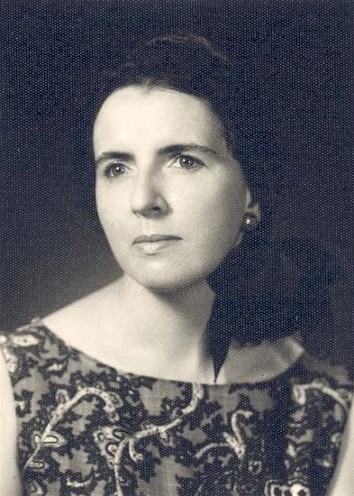Vovk, Vira
Vovk, Vira (Вовк, Віра; aka Wowk, Wira; pseudonym of Vira Selianska [Віра Селянська]), b 2 January 1926 in Boryslav, Drohobych county, Galicia, d 16 July 2022 in Rio de Janeiro, Brazil. Writer, literary scholar, and translator. Having been forced to emigrate by the Second World War, Vovk studied German language and literature in Germany, at Tübingen University and Munich University (1945–9), and completed her studies with a doctorate in 1950 at the Catholic University of Rio de Janeiro, where she remained as a lecturer and, in 1968–80, professor of comparative literature. From 1980 she taught at the Federal University in Rio. Vovk writes in three genres: poetry, prose, and drama. The most voluminous is her poetic output. Thirteenth collections have appeared so far: Iunist' (Youth, 1954), Zoria providna (The Leading Star, 1955), Elehiï (Elegies, 1956), Chorni akatsiï (Black Acacias, 1961), Liubovni lysty kniazhny Veroniky do kardynala Dzhovannibattisty (Love Letters of Princess Veronika to Cardinal Giovannibattista, 1967), Kappa Khresta (Kappa of the Cross, 1969), Meandry (Meanders, 1979), Mandalia (Mandala, 1980), Zhinohi masky (Women’s Masks, 1993), Moleben’ do Bohorodytsi (A Supplication to the Mother of God, 1997), Pysani kakhli (Painted Stove Tiles, 1999), Violia pid vechir (Viola in the Evening, 2000), and the book of collected poems Poeziia (Poetry, 2000). The poetry, which began as often derivative, formally unsophisticated lyricism, developed in her later collections into the highly complex and rhythmical free verse of her ‘elegies’ and the intricate multirhythms of her ‘ballads’, in which she mixes dialogue with narration and bilingual texts. Two major motifs flow through her poetry, exotic geography (the result of displacement) and religious mysticism. The interest in mysticism and myth carries over into her less-voluminous prose, which consists of the collections Legendy (Legends, 1954), Kazky (Fairy Tales, 1956), Dukhy i dervishi (Spirits and Dervishes, 1956), the novel Vitrazhi (Stained-Glass Windows, 1961), Stari panianky (Old Maids, 1993), and the book of collected prose Proza (Prose, 2001). Of special interest are her bilingual prose works, such as Sviatyi hai (The Holy Grove, 1983) and Karnaval (Carnival, 1986). In the realm of poetic drama Vovk has written, among others, Smishnyi sviatyi (The Funny Saint, 1968), Tryptykh (Triptych, 1982), Ikonostas Ukraïny (Iconostasis of Ukraine, 1988), and the book of collected dramatic works Teatr (Theater, 2002). Many of her publications, from the 1970s on, are exquisite esthetic productions with hand-inserted illustrations by Ukrainian artists (Zoia Lisovska, Mykhailo Dzyndra, Jurij Solovij, and others) or Vovk's own paper cutouts.
Vovk has devoted a great deal of time to translation into Ukrainian and into Portuguese and German. An annotated anthology of modern Portuguese and Brazilian poetry, Zelene vyno (Green Wine), appeared in 1964. She also collaborated in an anthology of Quebec poetry (1972) and in translations of Frederico García Lorca with Wolfram Burghardt, Hryhorii Kochur, and others. In addition to many of her own poems, she has rendered into Portuguese Antologia da Literatura Ucraina (1959), several anthologies of Ukrainian stories and folktales (Lendas Ucranianas [1959], A Canoa no mar [1972], Galos bordados [1972], Contos populares ucranianos [1983]), and a series of translations of some individual Ukrainian works by Hryhorii Skovoroda (1978), Taras Shevchenko (1980), Ivan Franko (1981), Vasyl Stefanyk (1982), and Lesia Ukrainka (1983). Her scholarly writing is mostly in Portuguese and German.
Since 1959 Vovk has been associated with the New York Group of poets. In 2008 she was awarded the Shevchenko Prize.
Danylo Husar Struk
[This article was updated in 2009.]

.jpg)
